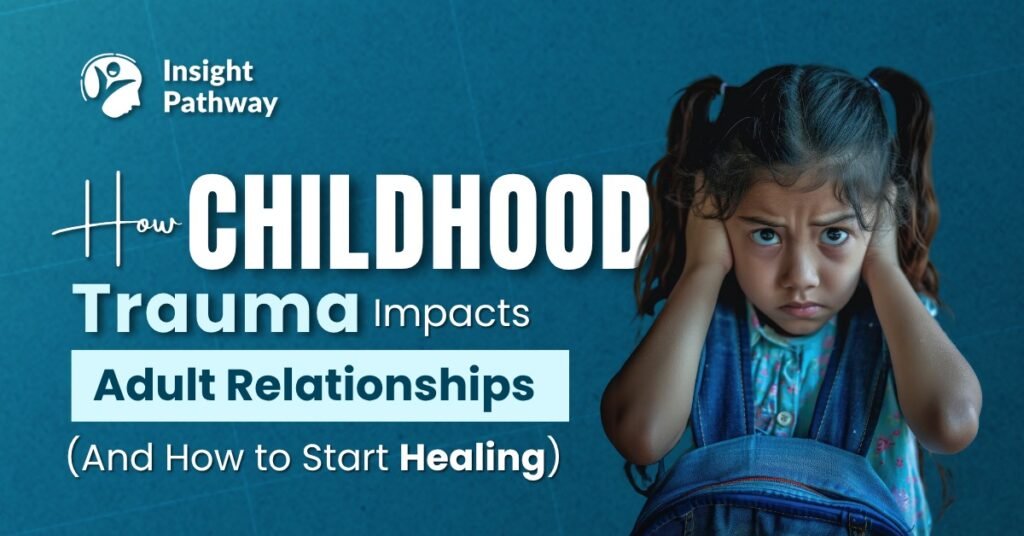What Is Childhood Trauma?
Childhood trauma refers to deeply distressing experiences during early development, such as emotional neglect, abuse, loss, or instability. While many assume childhood trauma only includes major events, even consistent emotional invalidation can leave lasting impacts.
Childhood can disrupt the brain’s development, influencing how individuals perceive safety, trust, and love. These patterns often carry into adulthood, affecting relationships in subtle and profound ways.

How Childhood Trauma Affects Adult Relationships
Attachment Styles and Trauma
Our first emotional bonds — usually with parents or caregivers — shape our attachment styles. Adults with unresolved childhood trauma often develop insecure attachment patterns, such as:
-
Anxious Attachment: Fear of abandonment, clinginess, and overdependence
-
Avoidant Attachment: Emotional distancing, reluctance to commit, difficulty trusting
-
Disorganized Attachment: A mix of fear and craving intimacy, often stemming from chaotic early experiences
If you’ve ever wondered, Why do I pull away when someone gets close? or Why do I panic when my partner is distant? — unhealed trauma may be at the root.
Common Relationship Patterns After Childhood Trauma
Unresolved childhood can lead to repeating certain patterns in adult relationships:
-
Trauma Bonding: Staying attached to harmful partners because chaos feels familiar
-
Poor Boundaries: Difficulty saying no or recognizing unhealthy behavior
-
Trust Issues: Expecting betrayal, even when it’s not present
-
Emotional Reactivity: Intense emotional responses to minor triggers
Recognizing these patterns is essential. You can’t heal what you don’t see.
Signs That Childhood Trauma Is Impacting Your Relationships
How can you tell if childhood trauma is affecting your adult life?
-
You fear being “too much” for your partner
-
You sabotage healthy relationships out of fear
-
You feel numb or disconnected during intimacy
-
Arguments escalate quickly into big fights
-
You experience anxiety when separated from loved ones
If several of these sound familiar, exploring your trauma history might be a powerful next step.
Healing From Childhood Trauma to Build Healthier Relationships
Inner Child Healing
One powerful approach to trauma recovery is inner child healing. This method involves reconnecting with the parts of yourself that were wounded as a child. Through therapy, journaling, and self-compassion exercises, you can learn to meet your unmet needs from the past.
Trauma-Informed Therapy
Working with a trauma-informed therapist can help you unpack how early experiences shaped your relational patterns. Modalities like EMDR (Eye Movement Desensitization and Reprocessing) or Somatic Experiencing are highly effective for trauma healing.
Building Secure Attachments
Healing isn’t about being “perfect” — it’s about learning to build safer, more secure relationships. Here’s how you can start:
-
Practice open communication, even when it feels uncomfortable
-
Set clear boundaries without guilt
-
Notice when you’re reacting from fear, not fact
-
Choose partners who respect your emotional needs
Healing from childhood trauma takes time, but every step you take brings you closer to the healthy, fulfilling connections you deserve.
Conclusion: Healing Is Possible
Understanding how early emotional wounds impact adult relationships is a powerful first step toward breaking painful patterns. Whether you’re starting therapy, practicing self-compassion, or learning to set better boundaries, remember: healing is a journey, not a destination.
Progress may feel slow at times, but every small step matters. Celebrating even tiny moments of growth — like communicating an emotion honestly or setting a healthy limit — builds momentum over time. True transformation isn’t about never struggling again; it’s about responding to challenges with more kindness, resilience, and wisdom.
Even on the hardest days, choosing yourself is an act of courage. With time, patience, and support, it’s possible to rewrite your story and create the kind of connections you’ve always deserved.
You deserve relationships that feel safe, nurturing, and empowering. And it all starts with giving yourself the grace to heal.


